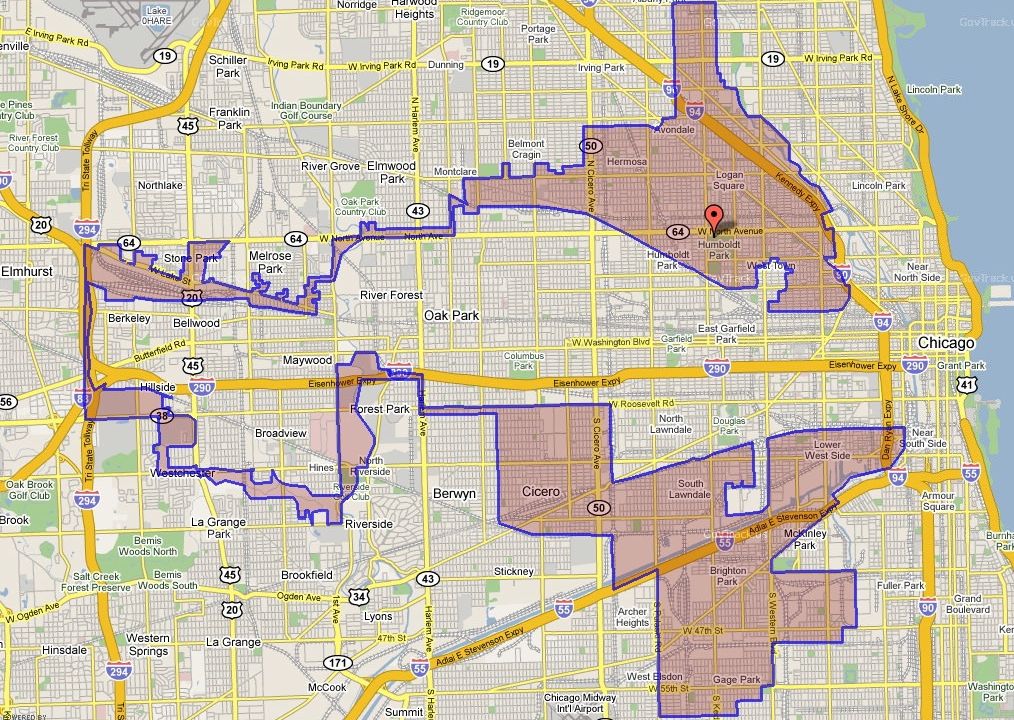
Illinois' 4th Congressional District map shows the utter insanity of one of the country's worst cases of gerrymandering. (SBTL1 / flickr Public Domain)
This post originally appeared at The Nation.
American democracy is not working. We have a president who lost the popular vote by almost 3 million ballots, a Congress that reflects gerrymandered district lines rather than the will of the people and a voting system that discourages rather than encourages the high turnouts that are needed to establish a genuinely representative democracy.
The Republican Party, which has benefited from this dysfunction, is in no rush to change things. Indeed, it has at its highest levels embraced the voter-suppression lies and scheming of charlatans such as Kansas Secretary of State Kris Kobach and President Trump’s Orwellian “Presidential Advisory Commission on Election Integrity.” So it falls to progressive Democrats, nonaligned independents and third-party activists to take the lead in the struggle for democratic renewal.
For the Democrats, there are two ways to address the crisis. First, they can carry on as they always have and hope that they get better at being an opposition party within a fundamentally flawed system. Second, they could propose to reform the system in ways that would begin to realize the promise of competitive elections and popular democracy.
Rep. Don Beyer has chosen the bolder route. Last week, the Virginia Democrat proposed the Fair Representation Act, a plan to democratize congressional elections with a bold reform that could also be used to bring real competition to state legislative contests.
Explaining that “polarization and partisanship, both among voters and in Congress, have reached dangerous and scary heights,” Beyer says: “The Fair Representation Act is the bold reform America needs to be sure every vote matters, to defeat gerrymandering and ensure the House of Representatives remains the people’s House.”
Rob Richie, the executive director of FairVote, which has worked with Beyer to promote the measure, says, “The Fair Representation Act is the most comprehensive approach to improving congressional elections in American history.”
FairVote argues that, “Under the Fair Representation Act, all US House members will be elected by ranked-choice voting in new, larger multi-winner districts. This system would replace today’s map of safe red and blue seats that lock voters into uncompetitive districts, and elect members of Congress with little incentive to work together and solve problems…”
Here’s FairVote’s assessment of how the Beyer plan would work:
Smaller states with five or fewer members will elect all representatives from one statewide, at-large district. States with more than six members will draw multiwinner districts of three to five representatives each. Congress will remain the same size, but districts will be larger.
They will be elected through ranked-choice voting, an increasingly common electoral method used in many American cities, whereby voters rank candidates in order of choice, ensuring that as many voters as possible help elect a candidate they support. Under ranked-choice voting, if no candidate reaches the threshold needed to win, the candidate with the fewest votes is eliminated. When a voter’s top choice loses, their vote instantly goes to their second choice. The process repeats until all seats are elected.
Using this approach, 4 in 5 voters would elect someone they support. The number of voters in a position to swing a seat would immediately triple — from less than 15 percent in 2016 to just under half.
The districts themselves will be drawn by state-created, independent commissions made up of ordinary citizens. These larger districts would be nearly impossible to gerrymander for political advantage — and would force politicians to seek out voters with different perspectives and remain accountable to them.
That’s a lot of democracy — more than most partisan Republicans, and a good many partisan Democrats, are prepared to embrace.
But here is why Democrats should take the Beyer plan seriously: It focuses attention on the necessity of breaking the curse of gerrymandering while at the same time presenting the Democrats as a party that embraces competition rather than political gamesmanship.
The Republicans, with tremendous support from billionaire campaign donors such as the Koch brothers, have mastered the art of making elections noncompetitive. Americans hate the current system. They tell pollsters it is too owned by special interests, too mangled by money, too deferential towards political careerists and too disrespectful toward voters.
The people are angry about gerrymandering. They want competitive elections and true representative democracy. (A 2013 Harris poll found that 74 percent of Republicans, 73 percent of Democrats and 71 percent of independents object to the pro-politician, anti-voter methods of redistricting that now prevail in most states for congressional and legislative elections.)
Combining support for the assault on gerrymandering that Beyer has proposed with support for a constitutional amendment to overturn the Supreme Court’s Citizens United ruling (as proposed by Vermont Sen. Bernie Sanders and others in the Senate and House) and with support for a constitutional amendment to guarantee the right to vote and to have that vote counted (as Wisconsin Rep. Mark Pocan and Minnesota Rep. Keith Ellison have proposed) would go a long way toward branding the Democrats as the party of reform that America needs.
By becoming the party of democratic renewal — promoting bold and meaningful changes that empower voters to end the malaise in Washington and state capitals nationwide — Democrats can make themselves the party of the future.
Americans are looking for just such a party. Lots of folks believe that neither old party can fill the political vacuum — and they could be right. But Rep. Beyer has offered his party an opportunity to rise above partisanship and stand on principle. Democrats, who have struggled to chart their course following the disastrous 2016 election, have a chance to identify themselves as the party that is ready to give voters what they are crying out for: a more honest and competitive politics.




